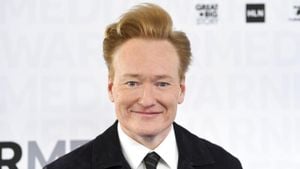Russia has unleashed one of its largest offensive attacks against Ukraine's energy infrastructure, marking another severe escalation in the nearly three-year war. The attack, which occurred on Sunday, involved the simultaneous launch of 120 missiles and 90 drones, leading to widespread devastation and civilian casualties across multiple regions, including Kyiv, Odesa, and Mykolaiv.
President Volodymyr Zelenskyy reported on social media platforms, including Telegram, saying the barrage targeted energy facilities and civilians alike, with “the enemy’s target being our energy infrastructure throughout Ukraine.” He lamented the damage caused by hits and debris, stating, “Unfortunately, there is damage to objects from hits and falling debris.”
Ukrainian air defenses reportedly intercepted 140 air targets, showcasing the intensity of the attack. Among the drones deployed were Iranian-made Shaheds, alongside various missile types ranging from cruise to ballistic. Despite these aggressive offensives, Ukrainian officials have voiced their unwavering determination to defend their homeland.
The aftermath of this significant assault has plunged large parts of the country, including major cities, without power. Following the attack, Ukraine's state grid operator, Ukrenergo, announced emergency measures to restrict power usage, driving fears of prolonged outages as winter approaches.
The Russian strikes are seen as part of Moscow's strategy to target Ukraine's energy resources with the aim of crippling its military capabilities during the harsh winter months. "Here we go again," said one official from a private energy company, capturing the despondent mood prevailing over the nation as they brace for more harsh conditions.
This latest wave of missile and drone assaults marks the eighth significant strike against Ukraine’s energy facilities this year alone. Since the onset of the war, Ukraine's energy sector has been battered with over 190 separate attacks, jeopardizing the already fragile electricity generation capacity.
The bombardments drew immediate condemnation from international leaders. UN Secretary-General Antonio Guterres described the attacks as violations of international humanitarian law. He issued clear statements emphasizing the need for immediate cessation of any assaults targeting civilians and infrastructure.
French President Emmanuel Macron echoed concerns, asserting his belief Putin “does not want peace” and is “not ready to negotiate” to end the conflict. He classified Russia's recent actions as part of an escalation aimed at intensifying warfare rather than moving toward resolution.
European Commission President Ursula von der Leyen asserted the European Union's commitment to support Ukraine, particularly during this winter as its energy infrastructure takes severe hits. “We will stand by Ukraine for as long as it takes,” she affirmed, highlighting the collective support from the bloc following the recent escalation.
Simultaneously, tension grew concerning the involvement of external forces as reports surfaced of North Korean troops being sent to Russia’s Kursk region, likely to aid their military strategies against Ukraine. This maneuver adds to growing concerns about the scale and nature of international participation and backing for both sides of this protracted conflict.
This recent escalation follows potential shifts within international alliances, especially after Donald Trump’s electoral victory. Trump has openly criticized U.S. financial support for Ukraine, inciting fears among Ukrainian officials about future reliance on U.S. assistance.
Despite the situation, Zelenskyy expressed hopes for a swift end to the war through diplomatic means, aiming for resolution by 2025. His assertion arrived as he responded to reports of the first direct dialogue between Putin and German Chancellor Olaf Scholz since the war escalated.
It underlines how the strategic communication between world leaders is being closely monitored. With countries like Poland enhancing their air defenses and the potential for significant shifts in U.S. foreign policy looming, the battle between Ukraine's resolve and Russia's onslaught continues to be watched globally.
Consequently, as residents hunker down for the upcoming winter months, uncertainty looms large. Both President Zelensky and his government stress the need for bolstered defense mechanisms to guard against these recurrent airstrikes and to recover swiftly from infrastructural damage.
So far, the resilience of civilians remains apparent, as they have persisted through repeated adversities over the past years. Football clubs, community gatherings, and local initiatives shine as beams of hope, serving to unite and motivate the public to stand firm against the looming challenges brought about by this continued aggression.
Experts affirm the importance of international support, emphasizing the need for upgraded air defense systems to protect Ukrainian territories. Ukrainian officials have consistently called for more mature military aid from Western allies, highlighting the troubling reality of their energy infrastructure and the broader affects of warfare.
With the recent significant strikes indicating no signs of relief on the horizon, both Ukraine and its allies remain vigilant, articulately strategizing their next moves and considering the humanitarian impacts of warfare, especially with winter starkly approaching.



